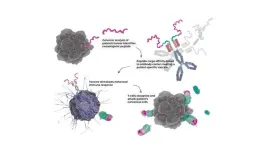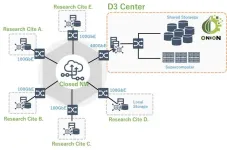Mental fatigue leads to loss of self-control by putting brain areas to sleep
A study identifies sleep-like activity in the brain of people subjected to demanding mental tasks associated with a greater tendency to aggressivity
2024-11-11
(Press-News.org)
Prolonged mental fatigue can wear down brain areas crucial for the individual ability to self-control, and cause people to behave more aggressively.
In a new multidisciplinary study published in the PNAS, a group of researchers from neuroscience and economics at the IMT School of Advanced Studies Lucca links the debated concept of "ego depletion", that is to say the diminution of willpower caused by previous exploitation of it, to physical changes in the areas that govern executive functions in the brain. In particular, the fatigue appears to correspond, in the awake brain, to an increase of the EEG waves typical of sleep in the frontal cortex zone dedicated to making decisions.
In the scientific literature, theories regarding so-called ego depletion emerged in the early 2000s. At their core, there is the idea that self-control is a limited cognitive resource for everyone, and therefore, the more it is exercised, the more it is exhausted. The literature in behavioral economics has used various types of cognitive manipulations typical of economic games to show the effect of ego depletion on behavior, for example less empathy towards others, a lower tendency to act altruistically, or a greater propensity to aggression.
In more recent years, however, this theory has been criticized: subsequent studies have not always managed to replicate the effect of "consumption" of willpower for individuals engaged in strenuous cognitive tasks or, if they have succeeded, they have found a much smaller effect than initially estimated. Moreover, the brain correlates of such an effect remained obscure.
The new study addresses the classic problem by adding the neuroscientific perspective. The research on sleep has identified a phenomenon called "local sleep": it happens when some brain areas in the awake individual begin to show on the EEG typical neural activity seen during sleep, namely delta waves. It has been shown that this happens particularly in cases of mental fatigue. “Our starting hypothesis was that local sleep would be the neuronal manifestation of the phenomenon of ego depletion known to psychology,” observes Erica Ordali, research fellow at the IMT School and first author of the paper.
To test this hypothesis, the researchers subjected a group of individuals to some fatigue tasks lasting one hour – instead of the classic fifteen minutes usually used in this type of study - in order to make the potential effect, if present, more evident. Next, individuals played economic games that required varying degrees of aggression and cooperation, including the so-called hawk and dove game. In this game, limited resources are to be shared in a hostile environment situation, with people having the choice between collaborating or overbearing behavior, that may result in the loss of resources for both parties. Compared to a control group not subjected to cognitive fatigue, the individuals who had undergone it proved to be significantly more uncooperative and hostile. Specifically, peaceful cooperation rate dropped from 86 percent in the "No Fatigue" to 41 percent in the "Fatigue" group (p>0.001, for a total of 447 subjects).
All study participants to the experiment (n=44) underwent electroencephalograms while playing economics games. In line with the study hypothesis, fatigued individuals showed the emergence of areas with typical sleep waves in some areas of the frontal cortex, which was completely absent in the others. “Our study shows that mental fatigue has a measurable effect on behavior and that, when a certain degree of fatigue sets in, people are more likely to behave in a hostile manner,” says Ordali.
“These results provide a scientific bases to popular wisdom that suggests to 'sleep on it' before making a decision, by showing that metabolic exhaustion within certain brain areas does affect our decision-making processes” says Pietro Pietrini, coauthor of the paper and Director of the Molecular Mind Lab at the IMT School, where the study was designed. “Overall, these findings have important implications for multiple situations in everyday life, including economic transactions and legal agreements, as they demonstrate that when the brain is 'tired' we may make choices that go even opposite to our own interest. As a matter of fact, this is what people do also in most criminal acts” concludes Pietrini.
The study was conducted by the IMT School for Advanced Studies Lucca in collaboration also with researchers at the University of Florence.
END
ELSE PRESS RELEASES FROM THIS DATE:
2024-11-11
Geologists have uncovered strong evidence from Colorado that massive glaciers covered Earth down to the equator hundreds of millions of years ago, transforming the planet into an icicle floating in space.
The study, led by the University of Colorado Boulder, is a coup for proponents of a long-standing theory known as Snowball Earth. It posits that from about 720 to 635 million years ago, and for reasons that are still unclear, a runaway chain of events radically altered the planet’s climate. Temperatures plummeted, and ice sheets that may have been several miles thick crept over every inch of Earth’s surface.
“This study presents the first physical evidence ...
2024-11-11
Ahead of COP29, Applied Microbiology International (AMI) has partnered with leading global scientific organisations to issue a unified call to action, spotlighting microbial solutions as pivotal in combating climate change.
In a strategic publication, released in multiple high-impact scientific journals at once, the joint paper advocates for the establishment of a global science-driven climate task force. This initiative aims to expedite the deployment of microbiome technologies, providing stakeholders worldwide with access to effective and immediate solutions.
Signatories of the paper, ‘Microbial solutions must be deployed against the climate catastrophe’ ...
2024-11-11
NEW ORLEANS – The Ochsner Transplant Institute served as one of 26 U.S. transplant centers collaborating in an HIV-to-HIV kidney transplant study published by The New England Journal of Medicine (NEJM). The article, Safety of Kidney Transplantation from Donors with HIV, details findings supporting HIV-to-HIV kidney transplants as safe and just as effective as those using organs from donors without HIV.
Human immunodeficiency virus, commonly known as HIV, attacks cells in the body that fight infection and there is currently no known cure. In the U.S.,1.2 million people are living with HIV. According to the National ...
2024-11-11
Washington, D.C. — Nov. 11, 2024 — Today, leaders from scientific societies, institutions and publishing bodies issued an urgent call for the global community and governments to take immediate and decisive emergency climate action. This appeal is made through an editorial published in mSystems, released on the opening day of the 2024 United Nations Climate Change Conference (COP29). Key contributors to this initiative include Virginia Miller, past president of the American Society for Microbiology (ASM); Jack Gilbert, Editor-in-Chief of mSystems; and Jay Lennon, ...
2024-11-11
Researchers at Uppsala University and KTH Royal Institute of Technology have developed a new form of precision medicine, an antibody, with the potential to treat several types of cancer. Researchers have managed to combine three different functions in the antibody, which together strongly amplify the effect of T cells on the cancer tumour. The study has been published in Nature Communications.
Researchers have developed a unique type of antibody that both targets and delivers a drug package via the antibody itself, while simultaneously activating the immune system (“3-in-1 design”) for personalised immunotherapy treatments.
“We ...
2024-11-11
Climate change events have, in recent years, placed increasing strain on public electrical grids in the United States. In response to this vulnerability, some consumers are turning to private alternatives to the electric utility, like generators and batteries. A new paper in the Journal of the Association of Environmental and Resource Economists studies who adopts these private alternatives and how adoption responds to grid failures. The paper also studies how public electric grid reliability may change due to this proliferation and how these changes will affect the wellbeing of all households.
In ...
2024-11-11
November 11, 2024 — All aspects of religiosity, spirituality, and meaning-making (R/S/M) relate to suicidality in people with a psychiatric diagnosis or a recent suicide attempt, according to a systematic review and meta-analysis published in Harvard Review of Psychiatry, part of the Lippincott portfolio from Wolters Kluwer.
"Protective dimensions seemed to exert relatively stable effects across different religions and life views," Bart van den Brink, MD, PhD, of the Department of ...
2024-11-11
Erin Eife, Assistant Professor, Criminology, Law and Society, College of Humanities and Social Sciences (CHSS), received funding for the project: “Surveillance as a Social Determinant of Health: Understanding the Impact of Pending Charges on Health Outcomes.”
Eife will conduct this research under the advisement of Evan Lowder, Associate Professor, Criminology, Law and Society, College of Humanities and Social Sciences (CHSS), and Lauren Brinkley-Rubinstein, Associate Professor in the Department of Population Health Sciences at Duke University.
Eife aims to produce knowledge about ...
2024-11-11
Tokyo & Osaka, Japan – Osaka University and NEC Corporation (NEC; TSE: 6701) are moving forward with efforts to realize a data infrastructure supporting Open Science. In 2021, The Joint Research Laboratory for Integrated Infrastructure of High Performance Computing and Data Analysis was established within the D3 Center, Osaka University (Director: Professor Susumu Date*1) by Osaka University and NEC. The result of the Joint Research Laboratory will be showcased at the International Conference for High Performance Computing, Networking, Storage, and Analysis (SC24) scheduled ...
2024-11-11
“As we eagerly adopt Al models, we need to take a moment to think about the potential biases that they may contain.”
BUFFALO, NY - November 11, 2024 – A new editorial was published in Oncotarget's Volume 15 on November 7, 2024, titled “ Beyond the hype: Navigating bias in AI-driven cancer detection.”
In this editorial, researchers from the Mayo Clinic emphasize the need to address potential biases in Artificial Intelligence (AI) tools used for cancer detection to ensure fair and equitable healthcare. Authors Yashbir Singh, Heenaben Patel, Diana V. Vera-Garcia, Quincy A. Hathaway, ...
LAST 30 PRESS RELEASES:
[Press-News.org] Mental fatigue leads to loss of self-control by putting brain areas to sleep
A study identifies sleep-like activity in the brain of people subjected to demanding mental tasks associated with a greater tendency to aggressivity



